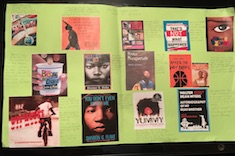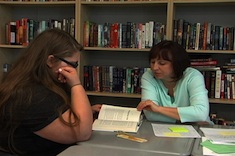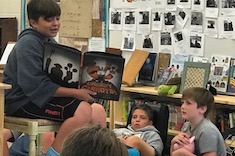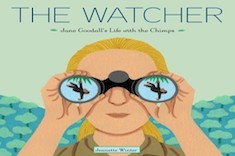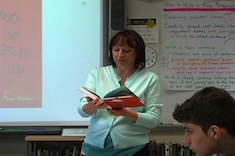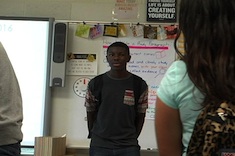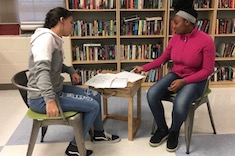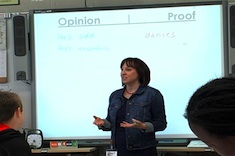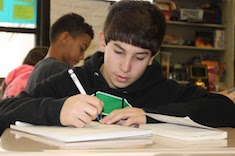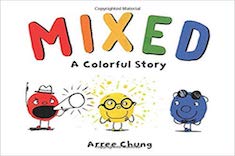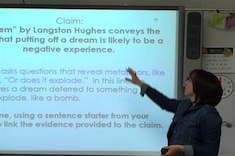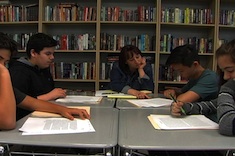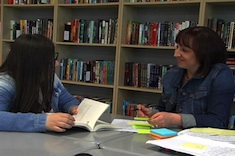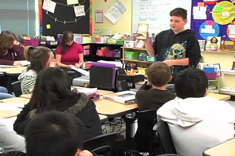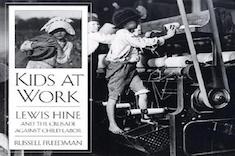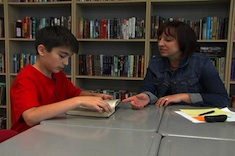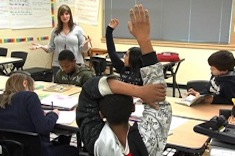8th
Latest Content
Building Reading Identities Across the Year
The start of the school year is often all about building reader identities in classrooms. And then October comes, and many of the activities that help students celebrate their reading histories and preferences are forgotten. Tara Barnett and Kate Mills share ways teachers can continue to help students define, refine, and expand their reading identities all year long.
Textual Lineage
Christy Rush-Levine uses book covers to help her middle-school students explore their histories (or “lineages”) as readers.
Building Reading Skills Book to Book: Conferring with Bridget
Christy Rush-Levine confers with eighth grader Bridget, coaxing her to compare and contrast the reading experience and plot twists in books.
Introducing Social Studies Concepts with Picture Books
Mark Levine explains how picture books are powerful teaching tools in his middle school classroom.
Read Aloud in Middle School
Katherine Sokolowski values read aloud for her middle school students and struggles to find time for them. Her solution? A picture book a day, better known as the #bookaday activity.
Reading and Thinking Aloud in Middle School
Mark Levine combines reading and thinking aloud in a minilesson to help his middle school students grapple with complex texts.
Jane Goodall Inquiry: Introducing Expectations
Katherine Sokolowski introduces her students to routines and expectations early in the year with a unit on Jane Goodall, including many short read alouds.
Back-Channel Conversations During Read Alouds
Christy Rush-Levine considers some of the “underground” ways in which she converses about books at conferences and on social media, and decides to set up a back channel for similar conversations about read alouds in her classroom.
Voices Mantra
Christy Rush-Levine’s eighth graders lead their classmates in a “voices” mantra. This shared chant created together starts each class with a sense of community and strength.
Summer Literacy
“What can I do to help my son and daughter stay sharp and not lose momentum during the summer?” When a parent asks this question, Mark Levine offers his Top Six Summer Slide Preventers.
Releasing the Teaching to Students
Mark Levine releases responsibility for teaching and assessment to students late in the school year, and hears echoes of learning from previous units.
Who Owns the Learning?
An enthusiastic student response to an author visit inspires Christy Rush Levine to revamp her upcoming unit on craft moves to foster more student ownership.
Opinion Proof Lesson
Christy Rush-Levine helps her students create an “opinion proof chart” in their notebooks. This exercise helps them build their skills in backing up opinions with evidence.
A Fresh Take on Persuasive Writing
Louise Wrobleski uses video clips, children’s literature, and newspaper articles to teach middle school students new ways to craft persuasive writing.
Reading That Changes Us
Tara Barnett and Kate Mills slow down the “Article of the Week” nonfiction reading activity, making space for more reflection and thoughtful discussion.
Reading Bingo
Gretchen Schroeder has developed a fun version of Reading Bingo to help students explore their identity as readers. The activity includes clever social media inspired options like creating memes and “bookstagram” posts.
Detour Texts
Clare Landrigan and Tammy Mulligan explain the concept of “detour texts”—picture books to use as mentor texts in the intermediate grades to illustrate complex literary elements. They also share three of their favorite new children’s books to use as detours.
Revising Literary Analysis Essays: Supporting Claims
Christy Rush-Levine presents a minilesson to her eighth-grade students about revising their literary analysis essays, using an analogy about putting furniture together.
Practical Revision Strategies
If your students are equating revision with proofreading and final cleanups, Tara Barnett and Kate Mills have some practical revision strategies you might want to try.
Mindful Test-Taking
High-stakes tests weigh on teachers and students through the winter and spring. Mark Levine shares mindfulness strategies for test-taking, explaining how to help students recommit and refocus in the midst of an exam.
The Magic That Might Go Down
Christy Rush-Levine decides to slow down in her classroom and engage more fully with a student who is a wiseacre and resistant reader. What happens next can only be described as magic.
Reset
Christy Rush-Levine finds her students sometimes need to stop and be challenged to think in more positive ways about their reading abilities. She describes how she designs minilessons for impromptu resets in her middle school classroom.
Poetry Connections
Poetry writing always has the potential to spark some magic in students. Christy Rush-Levine finds this magic requires a few conditions to be in place first in her middle school classroom.
Evidence Claims in a Middle School Small Group
Christy Ruth-Levine leads a small group of eighth graders as they explore how to include textual evidence in their literary analysis essays.
High Standards and Struggling Learners
Mark Levine explains why high standards can be helpful even for students who are struggling in his middle school classroom.
Cause and Effect: Conferring with Olivia
Christy Rush-Levine confers with Olivia about the principle of cause and effect in the novel she is reading.
Student-Led Minilessons in Middle School
One student’s request to lead a minilesson is a catalyst for Mark Levine to see the value of student-led minilessons as an assignment for all in his middle school classroom.
Russell Freedman Book Clubs
Mark Levine finds Russell Freedman book clubs are a great way for his middle school students to deepen their understanding of history and empathize with young people who have lived through previous eras.
History Through a Child’s Eyes: Conferring with Omar
Christy Rush-Levine confers with Omar, who is reading The Rock and the River. The book is a fictional account of a tumultuous time in civil rights history, considering protests through a child’s eyes.
Balancing Whole-Class and Independent Reading in Middle School
The choice between whole-class novels or independent reading can be a false one in many middle school classrooms. Katie Doherty’s sixth graders discuss their reading together of a novel in verse, and Katie explains how some shared whole-class texts can support independent reading.
Browse Content By
Type
Category
- Assessment Tools
- Big Fresh Archives
- Booklists
- Choice Numeracy
- Classroom Design
- Common Core
- Community Building
- Conferring
- Content Literacy
- Digital Literacy
- English Language Learners
- Equity
- Family Relations
- Free Samples
- Guiding Groups
- Leadership
- Literacy Coaches
- Mentor Texts
- Minilessons
- New Teacher Mentors
- Podcasts
- Poetry
- Quote Collections
- Reading Strategies
- Self Care
- Struggling and Striving Learners
- Talking and Listening
- Teacher Study Groups
- Teaching Reading
- Teaching Writing
- Word Study and Vocabulary
Author
- Melissa Quimby
- Nawal Qarooni
- Gwen Blumberg
- Julie Cox
- The Lead Learners
- Hannah Tills
- Josie Stewart
- Ruth Metcalfe
- Mallory Messenger
- Becca Burk
- Jodie Bailey
- Vivian Chen
- Mary Brower
- Tiffany Abbott Fuller
- Stephanie Affinito
- Ruth Ayres
- Leigh Anne Eck
- Heather Fisher
- Shari Frost
- Julie Johnson
- Suzy Kaback
- Gigi McAllister
- Shirl McPhillips
- Melanie Meehan
- Cathy Mere
- Debbie Miller
- Tara Barnett and Kate Mills
- Tammy Mulligan
- Dana Murphy
- Bitsy Parks
- David Pittman
- Brenda Power
- Heather Rader
- Matt Renwick
- Mandy Robek
- Christy Rush-Levine
- Gretchen Schroeder
- Jen Schwanke
- Brian Sepe
- Katherine Sokolowski
- Stella Villalba
- Jennifer Vincent
Grade Level
Choice Literacy Membership
Articles
Get full access to all Choice Literacy article content
Videos
Get full access to all Choice Literacy video content
Courses
Access Choice Literacy course curriculum and training


